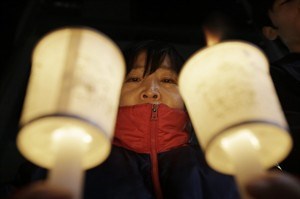
A South Korean conservative activist holds candles during a rally to wish the U.S. Ambassador to South Korea Mark Lippert a speedy recovery in front of Severance hospital in Seoul, South Korea, Friday, March 6, 2015. Police on Friday investigated the motive of the anti-U.S. activist they say slashed Lippert, as questions turned to whether security was neglected. (AP Photo/Ahn Young-joon)
Republished March 06, 2015 - 12:09 PM
Original Publication Date March 05, 2015 - 5:55 PM
SEOUL, South Korea - Police on Friday investigated the motive of the anti-U.S. activist they say slashed the U.S. ambassador to South Korea, as questions turned to whether security was neglected.
The attack Thursday on Mark Lippert, which prompted rival North Korea to gloat about "knife slashes of justice," left deep gashes on his face and hand. It also raised safety worries in a city with a reputation as a relatively low-risk diplomatic posting, despite regular threats of war from North Korea.
While an extreme example, the attack is the latest act of political violence in a deeply divided country where some protesters portray their causes as matters of life and death.
Lippert, 42, was recovering well but complaining of pain in the wound near his left wrist and a finger where doctors repaired nerve damage, Severance Hospital official Yoon Do-Heum said in a televised briefing. Doctors plan to remove the 80 stitches on Lippert's face on Monday or Tuesday and expect him to be out of the hospital by Tuesday or Wednesday. Hospital officials say he may experience sensory problems in his left hand for several months.
Seoul Central District Court granted a police request for the formal arrest of the suspect, Kim Ki-jong, 55, who could face charges including attempted murder, assaulting a foreign envoy, obstruction, and violating a controversial law that bans praise or assistance for North Korea, police officials said.
Police searched Kim's offices and house and seized hundreds of documents, books and computer files. Police also obtained Kim's telecommunication and financial transaction records to help investigate how the attack was planned and whether others were involved, police officials said.
Police are also looking into Kim's past travels to North Korea — seven times between 1999 and 2007 — during a previous era of inter-Korean co-operation, when South Korea was led by a liberal government.
Kim, who has a long history of anti-U.S. and violent protests, said he acted alone in the attack on Lippert. He told police he was protesting annual U.S.-South Korean military drills that started Monday — exercises that the North has long maintained are preparations for an invasion.
Security for Lippert was another focus.
U.S. State Department spokeswoman Marie Harf said Lippert had one full-time bodyguard assigned from the Seoul metropolitan police. She said Seoul is not a "high-threat" environment in which the U.S. Bureau of Diplomatic Security would deploy its own guards to protect the ambassador. She said "several" more South Korean police have now been added to Lippert's security detail.
According to a Seoul police officer who spoke on condition of anonymity, citing office rules, 29 officers were deployed as a precaution at Thursday's event, although all but four were on standby outside the building, the officer said.
"We are still getting all the facts about how people were screened to get into this event, how people were on the list, how they were allowed in," Harf told reporters in Washington.
Harf condemned North Korea's gloating response to the attack as "outrageously callous but unfortunately consistent with the nature of the regime and its rhetoric."
Kim was well-known among police and activists as one of a hard-core group of protesters willing to use violence to highlight their causes. He received a three-year suspended sentence in 2010 for throwing a piece of concrete at the Japanese ambassador to Seoul while protesting Japan's claim to small disputed islands that are occupied by South Korea.
More recently, Kim had been under investigation by Seoul prosecutors after allegedly assaulting at least one public employee at an outdoor pop concert in January.
When Kim entered the hall where the attack occurred, a police officer asked one of the event organizers whether he should be allowed to enter, Jongno district police Chief Yun Myung-sung told reporters. The organizing official answered that Kim could enter because he was associated with an organization that had been invited to the meeting.
A security expert called the police inept.
"There is no excuse for allowing a blacklisted person to enter the venue for an event like this," said Yu Hyung-chang, a professor at Kyungnam University in Changwon who served in South Korea's presidential secret service for 20 years until 2000.
Lippert became ambassador last October, and is a popular figure. He's regularly seen walking his basset hound, Grigsby, near his residence, not far from where the attack happened.
___
Associated Press writer Hyung-jin Kim in Seoul and Matthew Pennington in Washington contributed to this report.
___
Follow Foster Klug, AP's Seoul bureau chief, on Twitter at twitter.com/APKlug, and Kim Tong-hyung at twitter.com/KimTongHyung
News from © The Associated Press, 2015